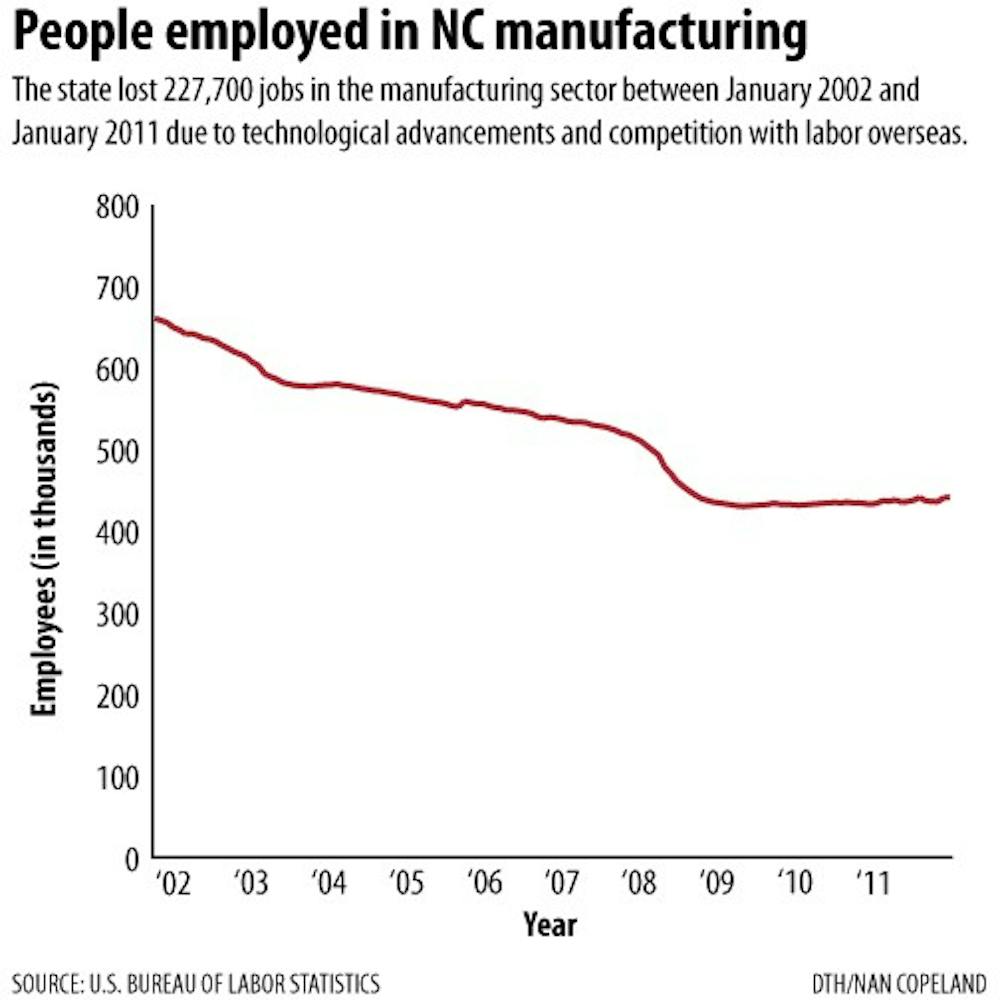“If it’s not made here, it’s not the same quality by any means,” he said.
Fletcher said the high quality of Durham Bookcases’ products has helped the company stay in business.
Preston Howard, president of the Manufacturers and Chemical Industry Council of North Carolina, said high end furniture companies are experiencing an uptick in sales.
“Companies are realizing that the quality of the workforce in some of the offshore sites is not as good as what they had here,” he said.
And while sectors such as textiles and furniture have faced a decline in employment, manufacturers of medical and electronic equipment have experienced slight growth, Dotson said.
The skills gap
Despite recent growth, these advanced manufacturing companies often face a gap between the skills their employees need and the skill sets of state residents.
“We need more high skill people to do modernized work,” said Jason Gray, an economist for the N.C. Rural Economic Development Center.
Chad Moutray, chief economist for the National Association of Manufacturers, said this could be a result of the misconception that manufacturing jobs are low-paying and for unskilled workers.
The average compensation for a manufacturing worker is $77,000, Moutray said.
“Americans like manufacturers, but when you ask them, ‘Are you going to work for a manufacturer, or are your kids?,’ you get a different answer,” Moutray said.
Mike Arcidiacono, manufacturing manager for Daetwyler Industries in Huntersville, said it can be difficult to find workers with the necessary skills.
To get the day's news and headlines in your inbox each morning, sign up for our email newsletters.
To address the skills gap, the company started an apprenticeship program for high school students, he said, and spends $150,000 per student trained.
Conway said improving education and community college systems is a key way to attract manufacturers.
“Community colleges should partner with employers to provide that training for high-tech jobs,” he said. “This is a much better investment of the state’s resources than simply giving a tax break or a subsidy.”
Spirit AeroSystems, a manufacturer of airplane parts, partnered with Lenoir Community College in Kinston to train students in advanced manufacturing and give students employment opportunities.
The program trains high school students and anyone interested in a job with Spirit AeroSystems, said Bobby Merritt, director of workforce development at Lenoir Community College.
Merritt said 140 students have completed the program and work for the company.
“The future of promoting manufacturing relies heavily on targeted workforce training,” said Allan Freyer, policy analyst for the left-leaning N.C. Justice Center.
Level playing field
Freyer said the future of manufacturing also depends on updating and improving the state’s tax codes.
Current tax reform proposals, such as one in the N.C. Senate to eliminate the state corporate income tax by increasing the sales tax, would harm manufacturers, he said.
“There’s a new political environment with the conservative majority,” Freyer said. “They don’t believe philosophically in picking winners and losers by helping manufacturers.”
The N.C. Rural Center recommended in a report that Gov. Pat McCrory create a state manufacturing council.
McCrory created a new assistant commerce secretary for manufacturing position last month.
“Private firms don’t have an organized voice in the state,” Gray said.
Fletcher said small manufacturing businesses, such as Durham Bookcases, are not on an even playing field with competitors — corporations that ship jobs overseas and receive large tax breaks.
“We’re supposed to be the backbone of the American economy, but we’re constantly pillaged and pushed down,” he said. “It’s difficult.”
Contact the desk editor at state@dailytarheel.com.



